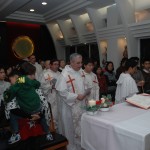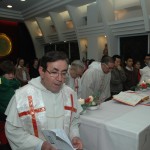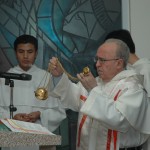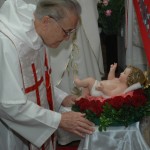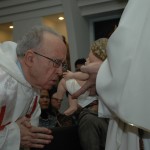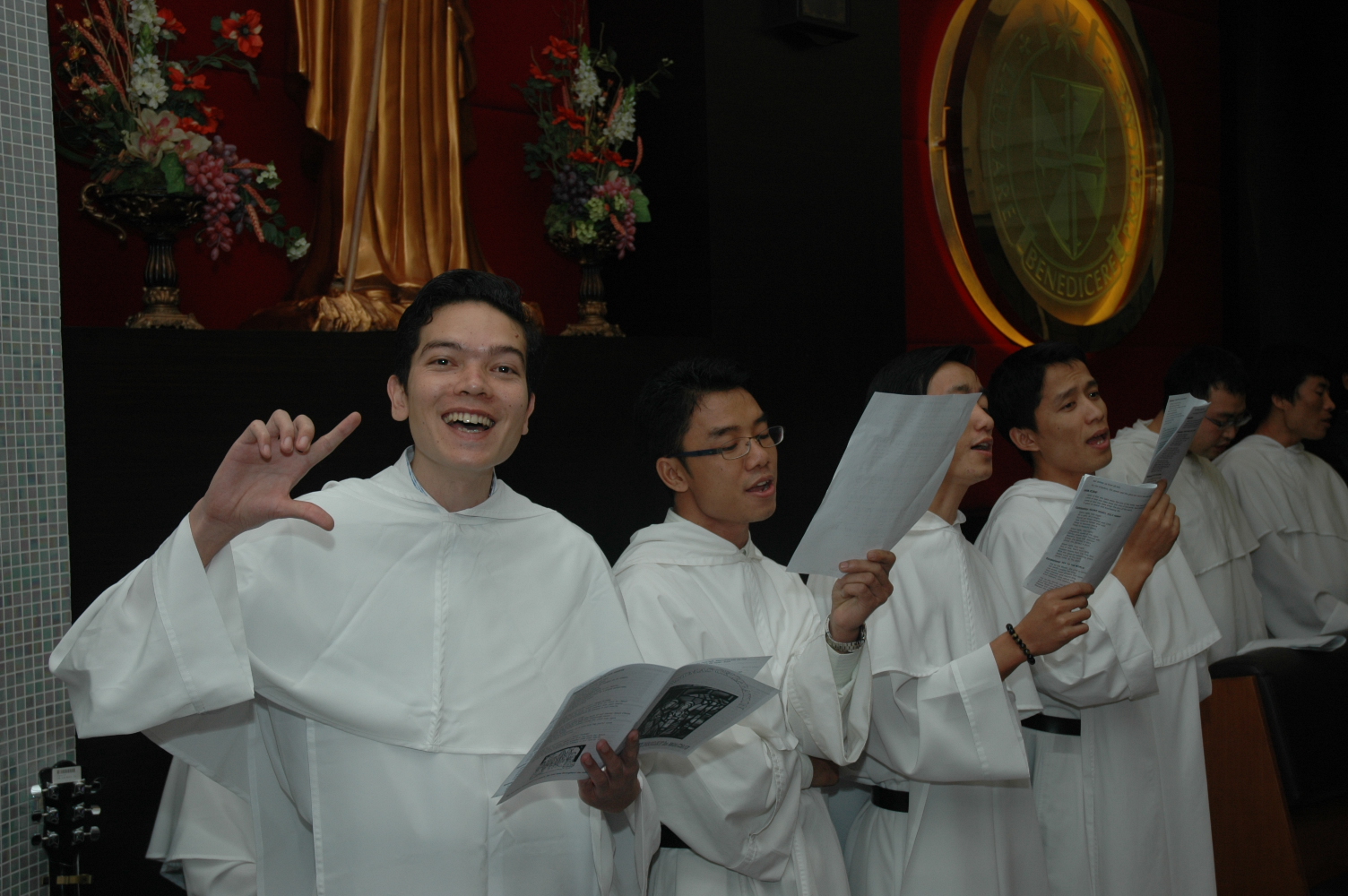

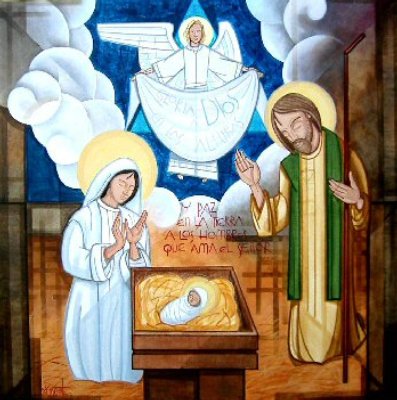
THE DECALOGUE OF CHRISTMAS
If you are sad, be glad!
Christmas is JOY.
If you have enemies, reconcile with them!
Christmas is PEACE.
If you have friends, look for them!
Christmas is ENCOUNTER.
If there are poor people near you, help them!
Christmas is GIFT.
If you have pride, bury it!
Christmas is HUMILITY.
If you have obligations, fulfill them!
Christmas is JUSTICE.
If you have sins, be converted!
Christmas is GRACE.
If you are in darkness, light your lamp!
Christmas is LIGHT.
If you have errors, reflect!
Christmas is TRUTH.
If you have hatred, forget it!
Christmas is LOVE.
. Unknown Author
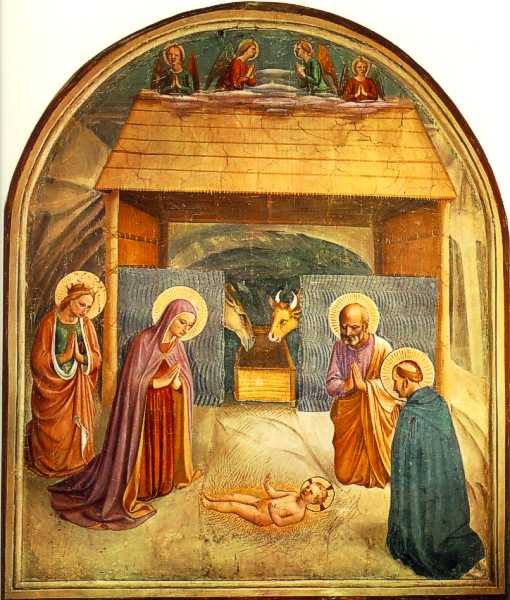
ECHOING THE WORD OF GOD
ECHOING THE WORD OF GOD:
CHRISTMAS DAY
Christ is born for us. Let us adore him.
1.    LITURDY OF THE WORD
First Reading: Is 52:7-10. “How beautiful upon the mountains are the feet of him who brings glad tidings, announcing peace, bearing good news, proclaiming salvation, and saying to Zion, ‘Your God is King’.†How beautiful it is announcing the greatest news of all, the mother of all news: Christ is born – for us! He is the Christ, or the anointed one. He is Emmanuel, or “God-with-us.†He is Jesus, or God saves. Indeed, how beautiful it is to preach the Good News to the whole creation!
Second Reading: Heb 1:1-6. In the past, God spoke in varied ways through the prophets. Today He speaks to us through his Son, who is the Word of God. The Son of God, Jesus, is the definitive Word, the final word, the totally sufficient Word (St. John of the Cross). And, as the angels worship him, we also worship him by kneeling before his Crib.
The Holy Gospel: Jn 1:1-18. “The Word became flesh and makes his dwelling among us… Of his fullness we have all received – love following love.†What an incomparable love! “God so loved the world that He gave his only begotten Son.â€Â To those who accept the Word, which is addressed to all, He empowers to become children of God. Thanks to the grace of Christ, we are children of God – dead to sin and alive in his love – and brothers or sisters to one another.
2.    MEDITATION: MERRY CHRISTMAS!
How many times have we said –and will continue to say- Merry Christmas? I say it again: May you have a Merry Christmas! What does Merry Christmas mean?
Christmas is Christ. Christ is the center of Christmas: the Child Jesus in a manger, the Child Jesus as the light of our Christmas – of our hearts. There cannot be a true Christmas without Christ. There can be no true Christmas if Christ is forgotten sidelined. The incarnation of Christ – and his resurrection – is the mystery of our faith: He became man – one like us, but without sin. Without Christ, Christmas is merely three meaningless letters: m, a, s. Truly, Merry Christmas means a happy encounter with Christ!
Christmas is love of God. It is God’s incredible love for us and our humble response to this love. How may we respond? We respond correctly by adoring the Child Jesus. Adoration ought to be our attitude through the Christmas season. It was the attitude of Mary and Joseph, the attitude of the shepherds, and the attitude of the Three Kings. Mary and Joseph kept everything in their hearts in an attitude of contemplative prayer. The shepherds knelt before the Child in the Crib. The Three Kings offered their gifts as a sign of worship. “O come, let us adore him.â€
Christmas is love of neighbor. Love of Christ in the manger entails love of Christ in the “little ones.â€Â “What you do to the least of my brothers and sisters, you do it to me.†“Only the poor, the hungry, those who need someone to come on their behalf, will have that someone. That someone is God, Emmanuel, God-with-us†(Oscar Romero). Christmas then is being closer to the poor around us and sharing something with them.
Christmas is joy. A birth in the family is always a great joy. How much more the birth of the Son of God, our brother and savior? “The Son of God is born in eternity without a mother; in time without a father, and became our brother†(John Tauler). This is yesterday, today and forever the greatest possible joy! Yes, Christmas is joy: “Joy to the world, joy to you and me.â€
Christmas is peace. The angels sung: “Glory to God in the highest and peace to men.â€Â Peace – like joy a consequence of love – means living together in justice and love, in harmony. As believers in Christ, the Prince of Peace, we are asked to be peacemakers in our communities, in our world – often an unjust and violent world. To become genuine peacemakers, we need to have inner peace: no one can give what he or she does not have. “Acquire inner peace and thousands around you will find liberation†(St. Seraphim).
3.    CONCLUSION
My co-pilgrims, may we have a Merry Christmas! That is, may your Christmas and mine be centered on Christ and permeated by love and joy and peace! Above all, may it be permeated by compassionate love for our suffering, needy, poor neighbor!
I have received a Christmas card with this message: “Christmas is any day of the year when a person approaches us and we regard him or her as our brother or sister, and treat him or her as a true brother or sister.†St. John the Evangelist tells us in the Prologue of his Gospel that we are God’s children if we accept Christ as our brother and savior. And if we are children of God, we have to accept and treat the others as our brothers and sisters in Christ.
Last September 2010, Fr. Amado Diago, a Dominican Spanish brother and a dear friend passed away in Taiwan, where he was a dedicated missionary for many years. I remember his words on a Christmas Night: “Fausto, place the Crib in your heart so that the Little One (el Pequeño) may continue growing in you.â€
May the Child Jesus be born in our hearts in a deeper way, and may those around us notice it by the way we treat them with kindness and compassion – with love.
May you all have a Merry Christmas!
FR. FAUSTO GOMEZ BERLANA, O.P.
St. Dominic’s Priory,
Macau, December 2010
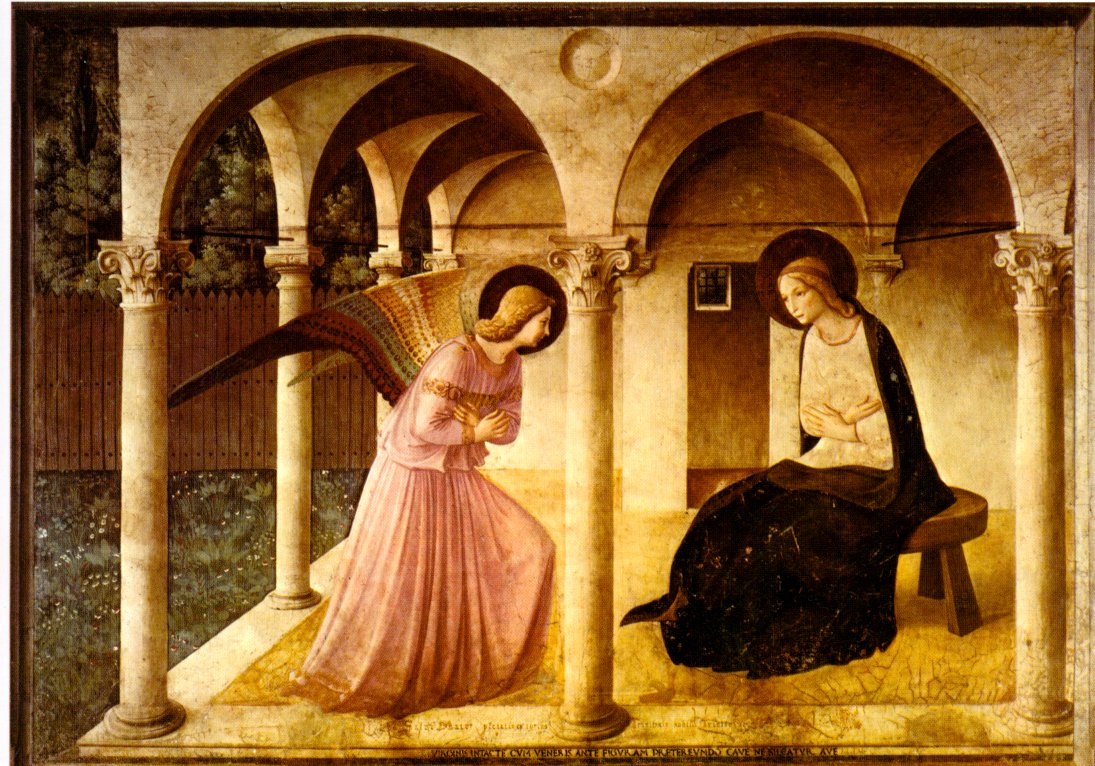
A Reflection on the Good News at Christmas (Lk 2:1-14)
A Reflection on the Good News at Christmas (Lk 2:1-14)
On the night when Jesus was born, the angel of the Lord appeared to the shepherds in the fields, saying: “Behold, I proclaim to you good news of great joy that will be for all the people. For today in the city of David a savior has been born for you who is Christ and Lord. And this will be a sign for you: you will find an infant wrapped in swaddling clothes and lying in a manger.â€
The sign by which we are to know that our salvation is at hand is a new birth of a little child! What can be more fragile and vulnerable than an infant? What can be more dependent and helpless than an infant? However, that very vulnerability, dependency and defenselessness is a sign for us to recognize the Son of man. Perhaps we are so used to such an image of the child Jesus at Christmas that we don’t appreciate the Good News expressed in this sign. Just as someone comments that we Christians lose our shame of worshipping the naked Jesus on the cross. We are too habituated to the celebration of Christmas to feel the outrageousness of the news of God-become-man!
No one is as small, dependent and vulnerable as an infant. But that is a sign leading us to God. But here the Good News is!
People in the course of human history have relentlessly searched for God and have tried their best to describe the God that they’ve experienced. To many people, God is beyond comprehension. Nonetheless, in His self revelation to us as recorded in the Old Testament Bible before Christ, He was known as a powerful judge with many human characteristics like vengeance, jealousy and love. But now, at Christmas, the Scripture announces that God has become an infant – fragile, poor, naked and helpless.
It is not because God couldn’t do otherwise, but He wills to do so in order to become an Emmanuel – “God is with us†– and, moreover, one with us in our humanity. In other words, God loves the humanness of humankind.
The Good News is that we no longer live in fear, with a belief in a judge of wrath, who would treat us as we treat each other. On the contrary, thanks to the message of Christmas, we can live in a parent-child relationship with God, trusting that He’s always loving and forgiving. In the same way as parents love their children, no matter what they do, who they are in life or how much they earn for the family, God loves us because we are human – His children.
If the Christmas Gospel announces the Good News about God, at the same time it announces the Good News about man. The nativity of Emmanuel – “God is with us†– has restored the relationship between God and man, and confirmed that we are the image of God on earth. We read in the catechism (CCC. 78) that, “For this is why the Word became man, and the Son of God became the Son of man: so  that man, by entering into communion with the Word and thus receiving divine sonship, might become a son of God.”
In our daily life, very often we judge and treat one another according to our appearance, talent, social status, wealth and influence.
So, how about the poor and needy? How about the underprivileged and unfortunate? How about the unknown and unvoiced? How about the children and unborn babies? Where are they in the social ladder? Is it because those people have yet to have any position on earth that their dignity is not recognized and respected properly? Is it the reason why many unborn babies have been aborted and humble people marginalized?
Here, the Christmas Gospel is the Good News about humankind: For God has become man, man’s dignity is not any longer defined by appearance, talent, status, wealth or influence. A person has dignity simply because she or he is a human being. To be human is to be the image of God since God has put on our humanity.
The Christmas Gospel is therefore the Good News about God, about humankind and remains Good News for every generation. Luke didn’t announce that Good News for his own contemporaries, but for all time, “for today,†for us, and now he would vibrantly announce to us the same message.
As long as the world is still in the darkness of fear or ignorance of God, the message of Christmas is necessary! As long as the transcendence of God is constrained in merely human vision and the condescension of God in human form is ignored and misunderstood, the message of Christmas is necessary! As long as people’s dignity is labeled merely by human values, from which its consequences are discrimination, exploitation, suppression, distain of the underprivileged and many other forms of “kiss-up kick-down,†etc. the Good News of Christmas still needs to be made more present, the Good News of today and for today!
So, our attitude towards Christmas should be that of the shepherds when they said, “Let us go, then, to Bethlehem to see this thing that has taken place, which the Lord has made known to us.†We today also say to each other the same thing or even in a more joyful manner, “O come all ye faithful!†Yet today’s “going to Bethlehem†doesn’t simply mean going to the crèche or to the cave of nativity modeling the scene of Jesus’ birth or even to the real Bethlehem in Israel. It is the opening of our heart to receive the Good News about our Lord and about ourselves, and treasure it and practice it in our life. Let the Christmas Gospel move our heart to find the infant Jesus among the poor, the outcast and the marginalized. In this way, the hymn of praise “Glory to God in the highest and peace to man of good will on earth†will no longer be on our lips only but also in our heart. The mystery of the Incarnation takes a central place in Christianity. If we are unable to meet God in human form, hardly we live our Christian faith in its strict meaning. If we fail to encounter God as a fellow human being, there is no point for us to be a Christian. If we proclaim at Christmas that God has become man while we wish to become a superman, it would be so hypocritical of us! May the joy of Christmas not overwhelm the Good News about God and about man. May our celebration of the holidays renew our faith and make it as alive and vibrant as God himself intended it to be. Amen!
by Peter Thoại

